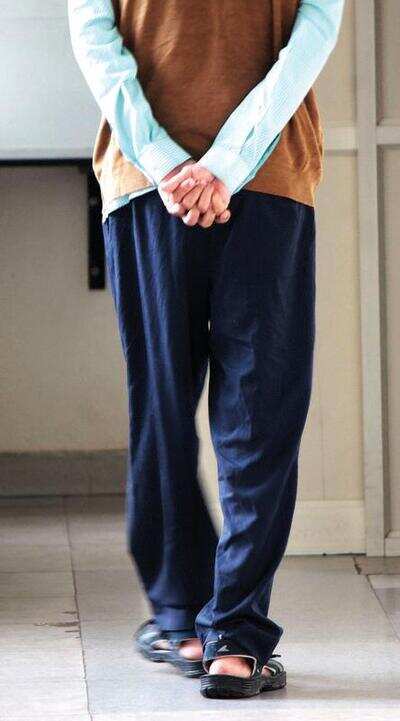MIND GAMES

When Maria Fernandes, 85, was diagnosed with dementia during the first Covid-19 wave in 2020, she had no family around. Living alone in a large house in her ancestral village, it was her neighbours who kept tabs on her, as her son and daughter-in-law, who live in the UK, couldn’t come home due to travel restrictions.
She isn’t the only one. In a state that has over 1.5 lakh senior citizens, Fernandes is just one of many who have dementia spectrum disorder but nobody to look after them, since their families are abroad.
A major problem
Every month, GMC alone sees 20 new patients with dementia spectrum disorders. These numbers are on par with other states, but Goa, with a large chunk of its workforce either abroad or elsewhere in India, presents a unique problem. Also, as joint families give way to nuclear families, the absence of dedicated care homes for dementia patients is a “huge problem”, experts say. “It is a major public health problem, since many elderly people are alone with their children abroad. We do not have a facility wherein a caregiver can visit a patient at home and monitor him regularly,” said Dr Teresa Ferreira, GMC’s head of neurology.
Nurses too costly
While home nurses are available for hire, they cost around Rs 30,000 a month, putting this service out of the reach of the average family. Even a caregiver charges around Rs 1,000-1,500 for a 12-hour shift.
Also, there’s no guarantee that a hired caregiver will look after the patient properly, said Dr Parul Dubey, consultant neurologist at Manipal hospital. “The attendant sits by the patient’s bedside glued to their mobile, and dictates terms to the nurses on duty. We see several such cases,” said Dubey.
Patrick Fernandes said that he tried to manage things through friends and neighbours after his mother’s dementia diagnosis, while he was in the UK.
“How could we burden others? Hiring a caregiver was never an option as I didn’t want an unknown person with my mother, we hear about so many nasty things happening to people who live alone,” he said.
In the absence of a better option, he finally had his mother shifted to a senior home before he returned to the UK last month. “After two to three episodes of my mother going missing, I could not risk her being left alone,” he said.
Plight unbearable
Dubey said that the plight of people having dementia and living alone is unbearable, even if children provide for the best care.
“Two months ago, an 85-year-old dementia patient was admitted after she suffered a stroke. None of her three sons could be with her in her last days, as they lived in different parts of the world and could not travel immediately. One managed to reach, but by then, his mother had passed away,” she said.
Diagnosis a tiny speck
Ferreira said that a medical facility alone can’t be the solution, as diagnosis is a tiny speck in the whole picture.
“Firstly, we require daycare centres to engage patients living alone. Even if a patient lives with a daughter or son, they may not be able to keep him stimulated, with them having other responsibilities, and they may also lack resources to hire a full-time attendant,” she said.
Part of the treatment is to improve the patient’s behaviour by engaging him in activities and maintaining his routine, and here, the role of care homes comes in. Also needed are daycare centres with pick-up and drop facilities.
“A caregiver may face the brunt as the aggression of the patient will be directed towards him. It is difficult to put a patient on correctional mode in a home setting,” she said.
Dementia homes are recommended to give caregivers some respite. Old-age homes do have trained nurses, but in India, neither is there much awareness about the disease, nor is there stress given on it, said Dr Sanat Bhatkar, consultant neurologist at GMC and Healthway hospital.
Caregivers need help
“A primary caregiver in the family should be counselled lest he/she slip into depression seeing the declining health of the parent,” Bhatkar said. “The mental health of caregivers is equally important in patient management, since they run the risk of suffering from caregiver burnout.”
The problem also stands aggravated as most patients are diagnosed late. In most cases, a patient’s real condition is revealed only when admitted to a hospital for a secondary illness.
Since it is generally believed that as one grows old, they would become forgetful, when a elderly person exhibits symptoms of the disease at an initial stage — like not remembering names and other things — it is often brushed aside as old age-related forgetfulness.
“It is only when a patient’s daily routine is affected that the true nature of the problem is realised,” Ferreira said. “It is difficult for a lone caregiver to manage a patient who is hallucinating or having bouts of agitation,” she added.
In the absence of dementia homes, although patients are sometimes admitted to hospital, it is not the right course of action, Ferreira said.
(Names of patients and relatives have been changed to protect their identities)
She isn’t the only one. In a state that has over 1.5 lakh senior citizens, Fernandes is just one of many who have dementia spectrum disorder but nobody to look after them, since their families are abroad.
A major problem
Every month, GMC alone sees 20 new patients with dementia spectrum disorders. These numbers are on par with other states, but Goa, with a large chunk of its workforce either abroad or elsewhere in India, presents a unique problem. Also, as joint families give way to nuclear families, the absence of dedicated care homes for dementia patients is a “huge problem”, experts say. “It is a major public health problem, since many elderly people are alone with their children abroad. We do not have a facility wherein a caregiver can visit a patient at home and monitor him regularly,” said Dr Teresa Ferreira, GMC’s head of neurology.
Nurses too costly
While home nurses are available for hire, they cost around Rs 30,000 a month, putting this service out of the reach of the average family. Even a caregiver charges around Rs 1,000-1,500 for a 12-hour shift.
Also, there’s no guarantee that a hired caregiver will look after the patient properly, said Dr Parul Dubey, consultant neurologist at Manipal hospital. “The attendant sits by the patient’s bedside glued to their mobile, and dictates terms to the nurses on duty. We see several such cases,” said Dubey.
Patrick Fernandes said that he tried to manage things through friends and neighbours after his mother’s dementia diagnosis, while he was in the UK.
“How could we burden others? Hiring a caregiver was never an option as I didn’t want an unknown person with my mother, we hear about so many nasty things happening to people who live alone,” he said.
In the absence of a better option, he finally had his mother shifted to a senior home before he returned to the UK last month. “After two to three episodes of my mother going missing, I could not risk her being left alone,” he said.
Plight unbearable
Dubey said that the plight of people having dementia and living alone is unbearable, even if children provide for the best care.
“Two months ago, an 85-year-old dementia patient was admitted after she suffered a stroke. None of her three sons could be with her in her last days, as they lived in different parts of the world and could not travel immediately. One managed to reach, but by then, his mother had passed away,” she said.
Diagnosis a tiny speck
Ferreira said that a medical facility alone can’t be the solution, as diagnosis is a tiny speck in the whole picture.
“Firstly, we require daycare centres to engage patients living alone. Even if a patient lives with a daughter or son, they may not be able to keep him stimulated, with them having other responsibilities, and they may also lack resources to hire a full-time attendant,” she said.
Part of the treatment is to improve the patient’s behaviour by engaging him in activities and maintaining his routine, and here, the role of care homes comes in. Also needed are daycare centres with pick-up and drop facilities.
“A caregiver may face the brunt as the aggression of the patient will be directed towards him. It is difficult to put a patient on correctional mode in a home setting,” she said.
Dementia homes are recommended to give caregivers some respite. Old-age homes do have trained nurses, but in India, neither is there much awareness about the disease, nor is there stress given on it, said Dr Sanat Bhatkar, consultant neurologist at GMC and Healthway hospital.
Caregivers need help
“A primary caregiver in the family should be counselled lest he/she slip into depression seeing the declining health of the parent,” Bhatkar said. “The mental health of caregivers is equally important in patient management, since they run the risk of suffering from caregiver burnout.”
The problem also stands aggravated as most patients are diagnosed late. In most cases, a patient’s real condition is revealed only when admitted to a hospital for a secondary illness.
Since it is generally believed that as one grows old, they would become forgetful, when a elderly person exhibits symptoms of the disease at an initial stage — like not remembering names and other things — it is often brushed aside as old age-related forgetfulness.
“It is only when a patient’s daily routine is affected that the true nature of the problem is realised,” Ferreira said. “It is difficult for a lone caregiver to manage a patient who is hallucinating or having bouts of agitation,” she added.
In the absence of dementia homes, although patients are sometimes admitted to hospital, it is not the right course of action, Ferreira said.
(Names of patients and relatives have been changed to protect their identities)
FOLLOW US ON SOCIAL MEDIA
FacebookTwitterInstagramKOO APPYOUTUBE
Start a Conversation
end of article









